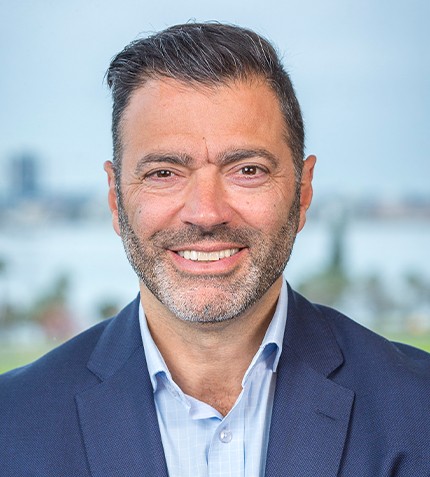
"The new Luanda Airport is a game changer. It provides the image and infrastructure required to position Angola as a logistics gateway."
RELATED PUBLICATION
ARTICLES FROM THIS PUBLICATION
Egídio Monteiro
CEO - SOUTHERN AFRICA, DHL
Can you briefly explain DHL's scope in Southern Africa?
In Angola, DHL provides a full suite of logistics services across the oil and gas value chain, from upstream to downstream. Our services include courier, air, ocean, road, and, soon, rail freight, particularly through the Lobito Corridor. We also offer shipping and husbandry services through our subsidiary. Additionally, we deliver value-added solutions such as controlled barge operations—between Luanda and Cabinda—with a 400 to 500-ton capacity. Soon, we will extend this barge service to Soyo and Cabinda. Our goal is to serve as a one-stop shop for customers, offering peace of mind through comprehensive, integrated logistics support. While oil and gas remains the most dynamic sector, DHL is active across multiple industries, including mining, healthcare, agriculture, telecommunication and construction.
What recent trends or developments in Angola's oil and gas industry impact DHL?
The industry is showing signs of increased dynamism and infrastructure development. New refineries are being built in Cabinda and Benguela. Green energy projects are progressing, and major operators are deploying new FPSOs. Angola is also supporting smaller neighboring countries such as Namibia and Mozambique. We are leveraging our experience in Angola to meet growing regional demand, including logistics support for Pemba and Nacala in Mozambique. Although there has been a temporary volume dip, we are confident that activity will reoccur.
What is DHL's involvement with the Lobito Corridor, and what is its significance?
The Lobito Corridor is a transformative logistics development. It provides a new transit route for mineral exports and other cargo from inland countries like the DRC. The corridor enables goods to reach Lobito and ship globally within 24 to 48 hours. DHL has been in Lobito for over 30 years, with offices, guesthouses, and operational capacity. The corridors development and terminals in Soyo, Namibe and Cabinda position Angola to become a regional logistics hub. The government's infrastructure investments are reinforcing this vision.
What role will the new Luanda Airport play in DHL's operations?
The new Luanda Airport is a game changer. It provides the image and infrastructure required to position Angola as a logistics gateway. DHL plans to move cargo efficiently between the airport and central Luanda using rail, reducing the need for road transport. We also plan to develop warehousing capacity and partner with other stakeholders to build the airport into a regional freight distribution hub. Synchronizing infrastructure, processes, and services will unlock its full potential.
What are DHL's biggest logistical challenges in Angola today?
Previously, challenges such as infrastructure limitations and customs delays were significant. Today, those issues have largely been resolved. Roads, terminals and logistics centers are functional, and customs clearance can now be completed in less than an hour—down from 15 days in the past. The challenge now is aligning customer expectations with service delivery. This includes improving communication, documentation and real-time updates. The other priority is strengthening partnerships with local companies. DHL focuses on empowering local SMEs rather than investing heavily in its assets. We support local trucking and warehousing partners and invest in training to raise compliance and service standards.
Digitalization is central to our strategy. Customers can track cargo from purchase order to delivery. We are also piloting tools that allow clients to share shipment visibility with their internal and external stakeholders. These platforms are particularly beneficial for SMEs, giving them the tools to manage logistics efficiently and transparently.
What are your expectations for Mozambique and Namibia?
Both markets have enormous potential. In Mozambique, we have operations in Pemba and serve terminals like Nacala by road or vessel. We are closely monitoring the security situation and are optimistic about project resumptions. In Namibia, discoveries are driving rapid development. We have an established office in Windhoek, are partnering and opening a warehouse in Walvis Bay, and are serving the port of Lüderitz. We are training Namibian staff in Angola to prepare them for project execution. Angola will play a vital support role in both countries due to its experience, proximity, and cultural ties.
What are DHL's priorities for the region for the coming year?
Digitalization, sustainability, and service innovation are major focus areas. We are integrating AI, expanding our green energy initiatives, and building out door-to-door and visibility-driven services.











